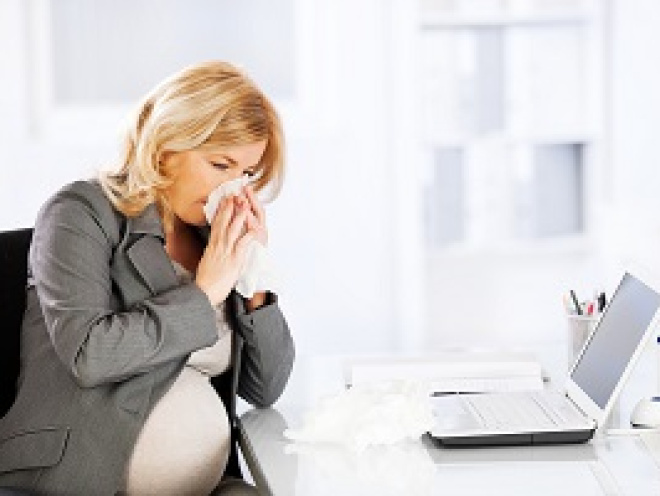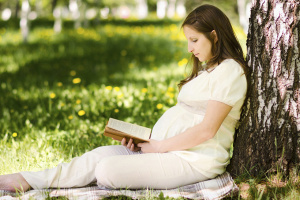If the prospect of spring fills you with dread because of hay fever, and pregnancy makes you wonder what to do, read our suggestions for keeping itchy eyes at bay.
Hay fever is an allergic reaction caused by breathing pollen in the air. It can make spring and summer miserable for those who suffer from it, as this is when pollen is at its highest.
"Common symptoms of hay fever include sneezing, a runny nose and itchy, watery eyes (Bumps, 2014)."
Rates of hay fever have been increasing in the UK, with 25% of the population suffering from it (Strachan, 1989; Runner’s World, 2018). Some research estimates that 40% of British children have hay fever (Allergy UK, 2018a).
If you don’t suffer badly from hay fever, treatment isn’t usually necessary or advised. If you are affected more severely with hay fever and are not able to cope with your symptoms, there are treatment options available (Bumps, 2014).
Can I take medicine?
If you suffer from hay fever during pregnancy or have a history of hay fever, you may be able to buy medicine over the counter. But you should get advice from a pharmacist or GP before taking any treatments (Bumps 2014; NHS Choices 2016).
Not all medicines are suitable when you’re pregnant as they might cause harm to your baby’s normal development (Bumps, 2014). Pharmacists are limited in which over-the-counter hay fever medicines they can sell (NHS, 2016).
Know your allergies
If you get hay fever, first try preventative measures, such as staying away from the pollen that triggers your condition. That means trying to work out what you are allergic to so you can keep away from it. A range of plants like grass, weeds or trees can cause hay fever.
Once you know which plants you react badly to, you can plan where to go and where not to. You could try to avoid parks and particular vegetation that you are sensitive to during the high pollen season (Pharmacy Magazine, 2017; Runner’s World, 2018).
If you’re allergic to grass pollen, you’ll tend to have hay fever from April to July (Pharmacy magazine 2017). Tree pollen is in the air from late March to mid-May. If you’re allergic to weed pollen, your hay fever will probably be worse from the end of June to September (The Telegraph, 2017).
The Met office website has a pollen forecast during the hay fever season. When pollen content is high, it’s best to avoid the allergen wherever possible (Allergy UK, 2018b; Runner’s World, 2018).
Get rid of pollen
The UK Teratology Information Service (UKTIS) suggests avoiding or limiting exposure to pollen as a method of being safe from hay fever (Bumps, 2014). Here are some things to try to limit your contact with pollen:
- Reduce the amount of pollen that can enter the house by shutting windows at night and first thing in the morning.
- Wear wraparound sunglasses to protect your eyes.
- Don’t mow the lawn, or sit or stand on grass.
- Wash your hands and face regularly, particularly when you get home.
- Put petroleum jelly around the edge of each nostril to trap or block pollen.
- Rinse the inside of your nose with an over-the-counter saline solution to wash out pollen.
- Avoid hanging clothes outside so they don’t come into contact with pollen.
- If you have pets, bathe and brush their hair regularly.
- Try to avoid contact with other irritants such as insect sprays or tobacco smoke.
(Bumps, 2014; Pharmacy magazine 2017; Runner’s world, 2018)
What will my GP recommend?
If you’ve tried avoiding pollen and you’re still suffering badly from hay fever, it might be worth visiting your pharmacist or GP. They may first suggest using nasal sprays and eye drops that contain medicines like sodium cromoglicate, corticosteroids, or antihistamines (NHS, 2016).
The medicine in nasal sprays and eye drops enters the blood stream in very small amounts. Hardly any will cross the placenta and so they are not expected to harm your unborn baby. These can also be bought over the counter, but it is best to consult your doctor first (Bump, 2014).
If these don’t help, your GP then might prescribe antihistamine tablets. The antihistamines that cause drowsiness may not be suitable to use while pregnant. Your doctor will assess which is the best antihistamine for you (Bumps, 2014).
Decongestant medicines are not usually recommended for use during pregnancy. These medicines relieve a blocked nose by causing the blood vessels to narrow. This could reduce blood flow to the placenta and your baby (Bumps, 2014).
This page was last reviewed in October 2018.
Further information
Our support line offers practical and emotional support with feeding your baby and general enquiries for parents, members and volunteers: 0333 252 4066.
We also offer antenatal courses which are a great way to find out more about birth, labour and life with a new baby.
Make friends with other parents-to-be and new parents in your local area for support and friendship by seeing what NCT activities are happening nearby.
Allergy UK. (2018a) Statistics. Available at: https://www.allergyuk.org/information-and-advice/statistics [Accessed 4th October 2018].
Allergy UK. (2018b) About allergy. Available at: https://www.allergyuk.org/information-and-advice/conditions-and-symptoms/47-about-allergy [Accessed 4th October 2018].
Bumps. (2014) Treatment of hay fever. Available at: http://www.medicinesinpregnancy.org/Medicine--pregnancy/Hay-fever/ [Accessed 4th October 2018].
NHS. (2016) Can I take hay fever medicine during pregnancy? Available at: https://www.nhs.uk/common-health-questions/pregnancy/can-i-take-hay-fever-medicine-during-pregnancy/ [Accessed 4th October 2018].
Pharmacy Magazine. (2017) Hayfever: The right response. Available at: https://www.pharmacymagazine.co.uk/hayfever-the-right-response [Accessed 4th October 2018].
Runner’s World. (2018) Hay fever and running – everything you need to know. Available at: https://www.runnersworld.co.uk/health/hay-fever-all-you-need-to-know [Accessed 4th October 2018].
Strachan DP. (1989) Hay fever, hygiene, and household size. Br Med J. 299: 1259-60.
The Telegraph. (2017) Why are so many people suddenly suffering from hay fever in middle age? Available from: https://www.telegraph.co.uk/health-fitness/body/many-people-suddenly-suffering-hay-fever-middle-age/ [Accessed 4th October 2018].







